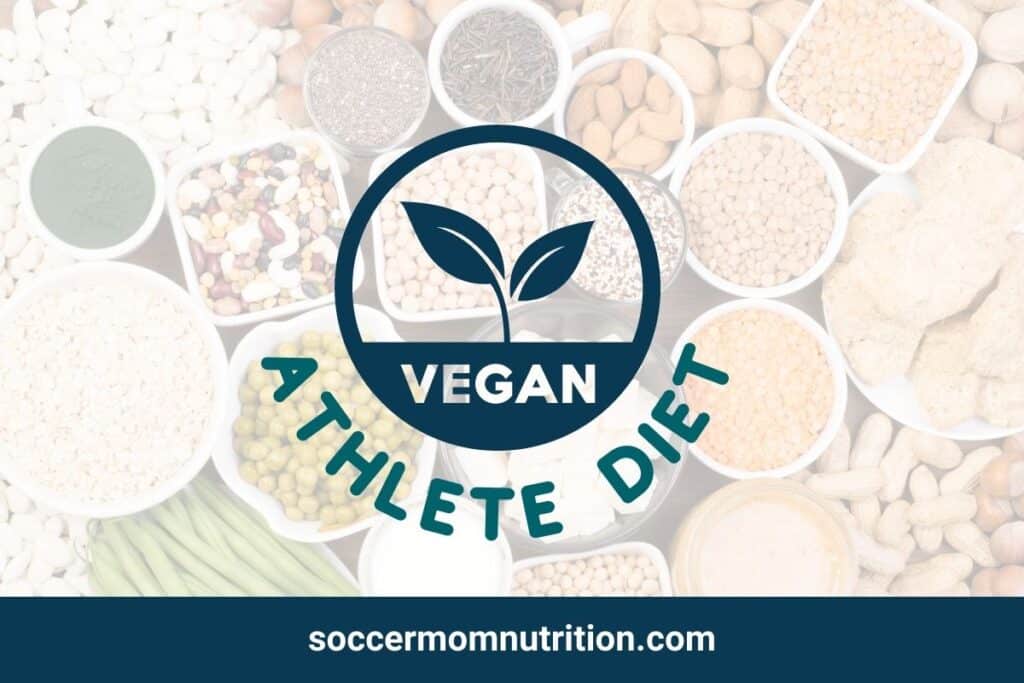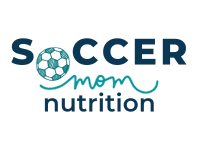Vegan Diet for Athletes: How to Fuel Your Performance
Are you an athlete who follows or wants to follow a vegan diet? It’s important to know about vegan diet for athletes and how to make sure you meet your protein and energy needs.
in recent years, the popularity of vegan diets has surged, and athletes are increasingly adopting this plant-based approach to fuel their performance.
A vegan diet for athletes is a powerful way to optimize nutrition while promoting sustainability. But it requires some planning and attention to ensure that you get enough calories, protein and other nutrients from plant-based foods.
This post explores the benefits of a vegan athlete diet, highlights how protein needs are met and provides delicious meal and snack examples to support optimal performance.

What is a vegan diet
A vegan diet is a plant-based eating pattern that excludes all animal-derived products, including meat, poultry, fish, dairy, eggs and honey. Instead, vegans consume a wide array of fruits, vegetables, whole grains, legumes, nuts and seeds.
This diet prioritizes nutrient-dense, fiber-rich foods that provide essential vitamins, minerals, antioxidants and complex carbohydrates.
What are the benefits and challenges of a vegan diet for athletes
Benefits
A vegan diet can offer many benefits for athletes, such as:
- Nutrient rich foods: Plant based diets focus on nutrient-rich foods because they focus on increased intake of fruits, vegetables and whole grains. These foods tend to be higher in fiber, antioxidants, vitamins C and E.
- Environment: Eating a vegan diet can reduce the environmental impact of food production by saving water, land and energy resources, reducing greenhouse gas emissions and biodiversity loss.
- Adequate carbohydrates: Since plant focused diets are generally high in carbohydrates, athletes can easily meet their energy needs to perform at their best.
- Performance: A vegan diet can enhance athletic performance by improving recovery time, reducing inflammation, increasing blood flow and oxygen delivery to muscles and providing optimal fuel for endurance and strength.
Challenges
However, a vegan diet also poses some challenges for athletes, such as:
- Calories: A diet focused on plant based foods tend to be lower in calories than animal-based foods. This means that you may need to eat more food or more calorie-dense foods to meet your energy needs.
- Protein: Plant based foods tend to be lower in protein than animal-based foods. You might need to eat more protein or more protein-rich foods to meet your protein needs.
- Low nutrient intake: A vegan diet may lack enough iron, calcium and vitamin D, and omega 3 fatty acids. Additionally vitamin B12 is a key nutrient often lacking in a vegan diet and often requires supplementation.
Working with a sports dietitian nutritionist, can help you plan a balanced and adequate vegan diet that meets your individual needs and preferences.
They can also provide guidance on how to choose the best supplements if needed.
How to meet protein needs on a vegan diet
One of the most common questions is how to get enough protein on a plant based vegan diet. Protein is an essential macronutrient that plays a key role in building and repairing muscle tissue, as well as supporting many other bodily functions.
However, contrary to popular belief, animal products are not the only sources of protein. In fact, there are many plant foods that contain high-quality protein that can meet the needs of vegan athletes.
These include:
- Legumes (beans, lentils, chickpeas): Legumes are excellent sources of plant-based protein. They provide a variety of essential nutrients, including fiber, iron and folate. They can be added to soups, stews, salads and veggie burgers.
- Tofu: Tofu, made from soybeans, is a versatile protein source with a mild taste and a firm or soft texture. It absorbs flavors well, making it suitable for stir-fries, curries and tofu scrambles.
- Tempeh: Similar to tofu, tempeh is also made from soybeans, but it has a firmer texture and a slightly nutty flavor. It works well in stir-fries, sandwiches and marinated dishes.
- Seitan: Seitan, also known as wheat meat or wheat gluten, is made from gluten, the protein found in wheat. It has a chewy texture and can be seasoned and cooked in various ways, such as grilling, sautéing or adding to stews.
- Quinoa: Quinoa is a complete protein source, meaning it contains all essential amino acids. It is a versatile grain-like seed that can be used as a base for salads, bowls or side dishes.
- Hemp seeds: Hemp seeds are small, nutrient-dense seeds that offer a good balance of protein, healthy fats and fiber. They can be sprinkled over smoothies, salads or yogurt for an added protein boost.
- Chia seeds: Chia seeds are rich in omega-3 fatty acids, fiber, and protein. They absorb liquid and form a gel-like consistency, making them suitable for puddings, overnight oats or as an egg substitute in baking.
- Edamame: Edamame are young soybeans that are harvested before they fully mature. They are a rich source of plant-based protein and can be enjoyed steamed, boiled or added to stir-fries, salads and soups.
These plant-based protein sources offer a variety of flavors, textures and nutrients, making them valuable components of a vegan athlete’s diet. In fact these are also great sources of protein for vegetarian diets too.
Incorporating a diverse range of these foods can help athletes meet their protein needs and support overall health and performance.
Additionally, combining different plant-based protein sources throughout the day can ensure a complete amino acid profile, meeting your body’s requirements.
How much protein does an athlete need
The amount of protein you need depends on several factors, such as their age, body weight, activity level, type of sport and training goals.
However, a general guideline is to aim for 1.4 to 2 grams of protein per kilogram of body weight per day. For example, a 50 kg (110 lbs) young athlete would need between 70 and 100 grams of protein per day. (1)
What are some examples of vegan meals and snacks for athletes
A vegan diet for athletes should include a balance of carbohydrates, protein and fat at each meal and snack. Carbohydrates provide the main source of energy for the muscles and brain, while protein helps to repair and build muscle tissue.
Fat also provides energy and helps with the absorption of fat-soluble vitamins and minerals.
Here are some examples of vegan meals and snacks for athletes that provide a good balance of macronutrients:
Breakfast
- Oatmeal with soy milk, nuts, seeds and fresh or dried fruit
- Smoothie with frozen fruit, chia seeds, peanut butter, plant-based protein powder and coconut milk
- Tofu scramble with spinach, mushrooms, tomatoes and whole wheat toast
- Overnight chia pudding made with almond milk, topped with fresh berries and a sprinkle of hemp seeds
- Whole grain toast with smashed avocado, sliced tomatoes and a drizzle of balsamic glaze
- Vegan protein pancakes made with mashed bananas, oat flour and plant-based protein powder, topped with nut butter and sliced bananas
Lunch
- Salad with mixed greens, roasted chickpeas, avocado, sunflower seeds and tahini dressing
- Lentil soup with whole wheat bread and hummus; veggie burger with whole wheat bun, lettuce, tomato, onion and vegan cheese
- Quinoa bowl with black beans, corn, salsa, cilantro, pepitas and lime juice
- Brown rice bowl, roasted sweet potatoes, steamed broccoli, sautéed tofu or tempeh and tahini sauce
- Quinoa salad with mixed vegetables, chickpeas and a lemon-tahini dressing.
- Vegan sushi rolls filled with brown rice, avocado, cucumber and tofu or tempeh.
- Sweet potato and black bean burrito bowl with salsa, guacamole and a side of baked tortilla chips.
Dinner
- Pasta with roasted cauliflower and arugula pesto
- Tofu stir-fry with brown rice and vegetables
- Bean chili with cornbread and vegan sour cream
- Pizza with whole wheat crust, tomato sauce, vegan cheese and vegetable toppings
- Curry with chickpeas, potatoes, spinach and coconut milk served with naan bread or rice.
- Spaghetti squash with marinara sauce, lentil “meatballs” and a side salad.
- Vegan lentil and vegetable curry served with brown rice or quinoa.
- Roasted vegetable and tofu kebabs marinated in a zesty lemon-herb sauce, served with quinoa pilaf.
Snacks
- Trail mix with nuts, seeds and dried fruit
- Apple slices with almond butter
- Granola bars or energy balls made with oats, dates, nuts and seeds
- Edamame beans with sea salt
- Carrot sticks with hummus
- Banana bread with walnuts
- Homemade protein bars made with dates, nuts, plant-based protein powder and a hint of cinnamon.
- Fresh fruit skewers with a side of almond butter or dairy-free yogurt dip.
Conclusion
A vegan diet for athletes can be a healthy and effective way to fuel your growth, health and performance. However, it requires some planning and attention to ensure that they get enough calories, protein and other nutrients from plant-based foods.
By following the tips and examples in this post, you can enjoy the benefits of a vegan diet without compromising your health or performance.
If you have any questions or concerns about your vegan diet, please consult a registered dietitian who can provide individualized advice and support.
Stephanie Magill, MS, RD, CD, FAND has over 22 years of experience in public health and nutrition. As a performance registered dietitian nutritionist, Stephanie specializes in sports nutrition and provides simple and actionable information so that athletes can be well fueled for high performance on and off the field. Stephanie has a Master’s Degree in Nutrition and is a Fellow of the Academy of Nutrition and Dietetics.

